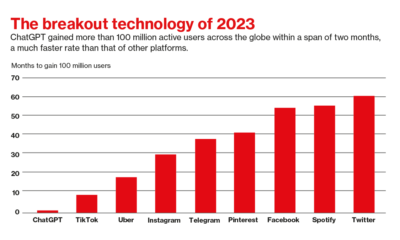Politics
Arbitration in Fintech Age: Resolving Disputes in Digital Financial Transaction
Published
9 months agoon
By
Drew Simpson
Navigating a financial transaction digitally can be complicated and fraught with potential disputes. With the recent rise of fintech, there’s an increasing number of opportunities to carry out online money transfers, payments, and investments for both businesses and individuals. But if anything goes wrong in such transactions – from severed contractual agreements to payment discrepancies – it can leave everyone involved feeling frustrated at best or scammed at worst.
Fortunately, arbitration offers a more efficient way of settling these financial disputes, allowing parties to have their issues fairly addressed without going through traditional court systems that often lack the financial acumen necessary to handle matters related to digital transactions. As we navigate this new era of technology-driven finance solutions, understanding how one might use arbitration processes is important to protect our rights as consumers or professionals when engaging in digital contracts.
What is Arbitration, and How Does it Work in the Fintech Age
Arbitration is a dispute resolution mechanism that has gained traction in the legal and financial world. This process involves a neutral third party, known as the arbitrator, who listens to both parties’ arguments and makes a final decision. This method of resolving disagreements has become increasingly popular in the fintech age, where more and more financial transactions are being conducted online.
When a dispute arises, arbitration can offer a quicker, more cost-effective alternative to traditional litigation. Furthermore, arbitration proceedings tend to be confidential, which is especially important in the fast-paced world of technology, where businesses want to maintain their reputation and customer trust. Despite its many benefits, arbitration has its drawbacks. Nonetheless, it is undoubtedly a valuable option for any business involved in financial transactions in the fintech space.
Benefits of Arbitration for Digital Financial Transactions
In the world of digital financial transactions, disputes can arise between parties that involve complex technicalities. This is where arbitration comes in as an effective and efficient alternative to litigation. Arbitration offers a streamlined process that can cut down on bureaucracy and cost while ensuring a fair resolution to any disputes.
Unlike traditional courtrooms, arbitration proceedings are confidential and can be tailored to fit the specific needs of the parties involved. Additionally, arbitration usually involves a third-party expert who can provide valuable insights into the technical aspects of the disputed issue. Overall, arbitration provides a reliable and efficient method perfect for resolving disputes arising from digital financial transactions. Therefore, it is important for companies to have a clear grasp of arbitration overview.
Advantages of Arbitration for Resolving Disputes
The rapidly growing fintech industry is changing how we interact with our finances. With this growth, however, comes an increase in disputes among industry players. One option for resolving such disputes is arbitration, which has several advantages over traditional litigation.
Arbitration is typically faster, less expensive
Arbitration is typically faster, less expensive, and more flexible than going to court. It also enables parties to select an arbitrator with specific expertise in the fintech industry, which can lead to more effective outcomes.
Additionally, arbitration proceedings and their outcomes are confidential, which can be particularly beneficial for fintech companies looking to protect their proprietary information and maintain their reputation. Overall, arbitration offers a compelling alternative for fintech players looking to resolve disputes cost-effectively and efficiently.
Challenges to Resolving Disputes through Arbitration
Although arbitration can be an efficient and effective way to resolve disputes outside of the courtroom, various challenges can still arise. One of the main concerns is the lack of transparency in the process. Unlike in court, arbitration proceedings are private and not open to the public; this can create issues around accountability and fairness.
Additionally, there have been concerns about the impartiality of arbitrators, as they are typically chosen by the parties involved in the dispute. Finally, there is always the possibility of enforcement issues, particularly when attempting to enforce awards in foreign jurisdictions. Despite these challenges, arbitration remains a popular alternative to traditional litigation, and with appropriate safeguards in place, it can be an effective way to resolve disputes.
What Companies are Doing to Support Arbitration Services
As businesses continue to expand globally, the need for efficient and effective dispute-resolution mechanisms becomes more critical. Many companies are turning to arbitration as a viable solution for resolving conflicts that arise. With the growing demand for arbitration services, businesses are taking much-needed steps to support this process. These companies are investing in training their employees to become skilled in arbitration and are partnering with reputable arbitration institutions to provide services in-house.
Additionally, companies are working to streamline their dispute resolution policies to ensure that arbitration is more accessible and efficient for employees and customers alike. By supporting arbitration services, businesses are enhancing their dispute-resolution capabilities and contributing to the overall growth of the arbitration industry.
Adopting Smart Technologies to Streamline the Process of Arbitration
Arbitration is crucial for companies looking to resolve disputes outside the court system. However, navigating the process can be quite challenging, especially if communication among parties is not effective. Today, with the advancement in technology, smart technologies such as virtual platforms and AI have streamlined the arbitration process. These new technologies have made the process less time-consuming and cost-effective, ultimately offering a more efficient way to resolve disputes.
Smart technologies have enabled parties to present their cases and evidence, mediate, and ultimately receive a decision from an arbitrator, all from the comfort of their respective locations. This adoption of smart technologies has changed the game in the arbitration world and will continue to do so in the future.
Preparing for the Future of Dispute Resolution in Fintech Age
The world of finance and technology is constantly evolving, and with it, the way we resolve disputes within these industries must also adapt. As fintech continues to reshape the financial services landscape, businesses and consumers alike need to prepare for the future of dispute resolution.
Advanced technologies such as artificial intelligence and blockchain are positioned to become central players in this process, revolutionizing how disputes are identified, analyzed, and resolved. However, these new tools must be combined with a human touch and a deep understanding of the underlying legal issues. It’s an exciting time in the world of dispute resolution, and those who embrace the changes will be best positioned for success in the fintech age.
The Bottom Line
Arbitration is becoming a mainstream part of digital finance and the Fintech Age. This dispute-resolution process incorporates both traditional methods and advanced technologies to ensure that customer issues are quickly addressed and resolved as soon as possible. Companies can benefit from the services provided by arbitration firms or build their own arbitration platforms to keep up with this trend.
However, some challenges, such as government legislation and funding allocation, may arise when using arbitration services. By adopting smart technologies to streamline the arbitration process and learning about the various aspects of full-service dispute resolution, companies can be well prepared for future conflict resolution processes in the Fintech age. A clear understanding of these principles will allow businesses to create comprehensive strategies to ensure successful dispute resolution in digital finance.
Featured Image Credit: Liza Summer; Pexels; Thank you!
You may like
-


Chinese apps are letting public juries settle customer disputes
-


Google CEO Sundar Pichai on Gemini and the coming age of AI
-


The Download: AI coding assistants, and China’s app disputes
-


Procurement in the age of AI
-


Finding value in generative AI for financial services
-


This viral game in China reinvents hide-and-seek for the digital age
Politics
Fintech Kennek raises $12.5M seed round to digitize lending
Published
7 months agoon
10/11/2023By
Drew Simpson
London-based fintech startup Kennek has raised $12.5 million in seed funding to expand its lending operating system.
According to an Oct. 10 tech.eu report, the round was led by HV Capital and included participation from Dutch Founders Fund, AlbionVC, FFVC, Plug & Play Ventures, and Syndicate One. Kennek offers software-as-a-service tools to help non-bank lenders streamline their operations using open banking, open finance, and payments.
The platform aims to automate time-consuming manual tasks and consolidate fragmented data to simplify lending. Xavier De Pauw, founder of Kennek said:
“Until kennek, lenders had to devote countless hours to menial operational tasks and deal with jumbled and hard-coded data – which makes every other part of lending a headache. As former lenders ourselves, we lived and breathed these frustrations, and built kennek to make them a thing of the past.”
The company said the latest funding round was oversubscribed and closed quickly despite the challenging fundraising environment. The new capital will be used to expand Kennek’s engineering team and strengthen its market position in the UK while exploring expansion into other European markets. Barbod Namini, Partner at lead investor HV Capital, commented on the investment:
“Kennek has developed an ambitious and genuinely unique proposition which we think can be the foundation of the entire alternative lending space. […] It is a complicated market and a solution that brings together all information and stakeholders onto a single platform is highly compelling for both lenders & the ecosystem as a whole.”
The fintech lending space has grown rapidly in recent years, but many lenders still rely on legacy systems and manual processes that limit efficiency and scalability. Kennek aims to leverage open banking and data integration to provide lenders with a more streamlined, automated lending experience.
The seed funding will allow the London-based startup to continue developing its platform and expanding its team to meet demand from non-bank lenders looking to digitize operations. Kennek’s focus on the UK and Europe also comes amid rising adoption of open banking and open finance in the regions.
Featured Image Credit: Photo from Kennek.io; Thank you!
Radek Zielinski
Radek Zielinski is an experienced technology and financial journalist with a passion for cybersecurity and futurology.
Politics
Fortune 500’s race for generative AI breakthroughs
Published
7 months agoon
10/11/2023By
Drew Simpson
As excitement around generative AI grows, Fortune 500 companies, including Goldman Sachs, are carefully examining the possible applications of this technology. A recent survey of U.S. executives indicated that 60% believe generative AI will substantially impact their businesses in the long term. However, they anticipate a one to two-year timeframe before implementing their initial solutions. This optimism stems from the potential of generative AI to revolutionize various aspects of businesses, from enhancing customer experiences to optimizing internal processes. In the short term, companies will likely focus on pilot projects and experimentation, gradually integrating generative AI into their operations as they witness its positive influence on efficiency and profitability.
Goldman Sachs’ Cautious Approach to Implementing Generative AI
In a recent interview, Goldman Sachs CIO Marco Argenti revealed that the firm has not yet implemented any generative AI use cases. Instead, the company focuses on experimentation and setting high standards before adopting the technology. Argenti recognized the desire for outcomes in areas like developer and operational efficiency but emphasized ensuring precision before putting experimental AI use cases into production.
According to Argenti, striking the right balance between driving innovation and maintaining accuracy is crucial for successfully integrating generative AI within the firm. Goldman Sachs intends to continue exploring this emerging technology’s potential benefits and applications while diligently assessing risks to ensure it meets the company’s stringent quality standards.
One possible application for Goldman Sachs is in software development, where the company has observed a 20-40% productivity increase during its trials. The goal is for 1,000 developers to utilize generative AI tools by year’s end. However, Argenti emphasized that a well-defined expectation of return on investment is necessary before fully integrating generative AI into production.
To achieve this, the company plans to implement a systematic and strategic approach to adopting generative AI, ensuring that it complements and enhances the skills of its developers. Additionally, Goldman Sachs intends to evaluate the long-term impact of generative AI on their software development processes and the overall quality of the applications being developed.
Goldman Sachs’ approach to AI implementation goes beyond merely executing models. The firm has created a platform encompassing technical, legal, and compliance assessments to filter out improper content and keep track of all interactions. This comprehensive system ensures seamless integration of artificial intelligence in operations while adhering to regulatory standards and maintaining client confidentiality. Moreover, the platform continuously improves and adapts its algorithms, allowing Goldman Sachs to stay at the forefront of technology and offer its clients the most efficient and secure services.
Featured Image Credit: Photo by Google DeepMind; Pexels; Thank you!
Deanna Ritchie
Managing Editor at ReadWrite
Deanna is the Managing Editor at ReadWrite. Previously she worked as the Editor in Chief for Startup Grind and has over 20+ years of experience in content management and content development.
Politics
UK seizes web3 opportunity simplifying crypto regulations
Published
7 months agoon
10/10/2023By
Drew Simpson
As Web3 companies increasingly consider leaving the United States due to regulatory ambiguity, the United Kingdom must simplify its cryptocurrency regulations to attract these businesses. The conservative think tank Policy Exchange recently released a report detailing ten suggestions for improving Web3 regulation in the country. Among the recommendations are reducing liability for token holders in decentralized autonomous organizations (DAOs) and encouraging the Financial Conduct Authority (FCA) to adopt alternative Know Your Customer (KYC) methodologies, such as digital identities and blockchain analytics tools. These suggestions aim to position the UK as a hub for Web3 innovation and attract blockchain-based businesses looking for a more conducive regulatory environment.
Streamlining Cryptocurrency Regulations for Innovation
To make it easier for emerging Web3 companies to navigate existing legal frameworks and contribute to the UK’s digital economy growth, the government must streamline cryptocurrency regulations and adopt forward-looking approaches. By making the regulatory landscape clear and straightforward, the UK can create an environment that fosters innovation, growth, and competitiveness in the global fintech industry.
The Policy Exchange report also recommends not weakening self-hosted wallets or treating proof-of-stake (PoS) services as financial services. This approach aims to protect the fundamental principles of decentralization and user autonomy while strongly emphasizing security and regulatory compliance. By doing so, the UK can nurture an environment that encourages innovation and the continued growth of blockchain technology.
Despite recent strict measures by UK authorities, such as His Majesty’s Treasury and the FCA, toward the digital assets sector, the proposed changes in the Policy Exchange report strive to make the UK a more attractive location for Web3 enterprises. By adopting these suggestions, the UK can demonstrate its commitment to fostering innovation in the rapidly evolving blockchain and cryptocurrency industries while ensuring a robust and transparent regulatory environment.
The ongoing uncertainty surrounding cryptocurrency regulations in various countries has prompted Web3 companies to explore alternative jurisdictions with more precise legal frameworks. As the United States grapples with regulatory ambiguity, the United Kingdom can position itself as a hub for Web3 innovation by simplifying and streamlining its cryptocurrency regulations.
Featured Image Credit: Photo by Jonathan Borba; Pexels; Thank you!
Deanna Ritchie
Managing Editor at ReadWrite
Deanna is the Managing Editor at ReadWrite. Previously she worked as the Editor in Chief for Startup Grind and has over 20+ years of experience in content management and content development.
